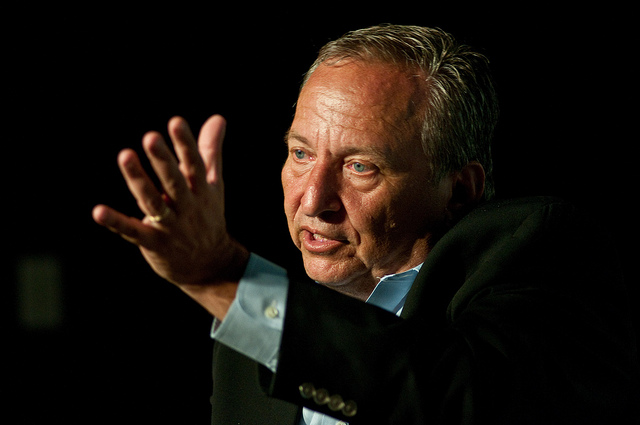(Larry Summers | Kevin Moloney/Flickr/Creative Commons)
The reason Larry Summers has become a leading candidate for Federal Reserve chairman is because President Obama is now leaning his way. No, I don’t have direct proof of that, but some journalists claim they have heard this from insiders. And the reason this is credible is that Obama is a centrist on economic issues.
Contrary to some claims, there are no mysteries about Summers’s view on monetary economics. Inflation is his big concern, as was Alan Greenspan’s. If Summers is appointed, we will return to the era of bond trader dictatorship. Obama simply wants protection from “inflationary expectations,” the bugaboo of the Clinton 1990s.
Any sign that the bond traders will push up rates for fear a strengthening economy will generate inflation will provoke a quick reaction from Summers. He is far more likely to crack down on the economy than his competitor, the estimable Janet Yellen.
Indeed, Yellen recently made the much-needed case for resurrecting employment as a Fed goal, on equal footing with others. Wall Street regards her with danger. Greenspan practiced the opposite. He was worried workers would regain confidence and ask for a raise.
| If he is chairman of the Federal Reserve, jobs will remain hostage to Wall Street needs. |
Is Summers as profound an ideologue as Greenspan? Of course not. He will be more flexible. But jobs will remain hostage to Wall Street needs if he is chairman.
The 1990s record is pretty clear. The Clinton administration had a virtual romance with Greenspan. When he unexpectedly pushed up rates in 1994, Clinton was furious. He had gotten his landmark tax increase passed the year before, a highlight of his administration. The Fed chairman raised rates anyway, but Secretary of the Treasury Robert Rubin urged him not to say a word publicly. Give Greenspan his independence. It’s likely Summers, then Assistant Secretary of the Treasury, reinforced his boss’ view.
Basically, Clinton, Robert Rubin and Summers had a pact with Greenspan. Any increase in tax revenues would be used to pay down debt, not to build up social programs. Some spending on public investment occurred, but only in the late 1990s, leaving federal public investment at historically low levels.
I was at a closed meeting of the Democratic leadership while Bush was president when one Congresswoman pleaded for more infrastructure spending. Let me remind everyone, said Summers, infrastructure spending is still government spending.
Of course, Summers favors more fiscal stimulus now. It’s a no-brainer. Even Bernanke is talking about fiscal stimulus, and he was mostly a right-of-center monetarist, solely concerned about inflation targeting, until he had to face the real world of the 2008 crash as Fed chairman.
So, if Summers is Fed chairman, expect slower growth and higher unemployment than necessary in the future. Nothing would better serve the nation’s economy than raising the inflation target right now, and Yellen would more vigorously pursue that than Summers. But under Summers, the stock market might rise because interest rates are more likely to remain low. He is a Wall Street man, not a Main Street man.
As for financial regulation, Summers has an implicit record there, too. It is a miserable one.
He was one of the ringleaders who kept derivatives free of regulation, the only serious mistake Clinton admitted to in his recent book, Back To Work. Clinton persists in saying that ending Glass-Steagall did not cause the financial crisis eight years later. This is a naïve and narrow interpretation. Undoing it enabled banks to grow much larger through diversification and acquisition, and to take on far more risk. In some ways, this forced investment banks to take more risk in order to compete. Citigroup, while Rubin was there, bought trailers full of risky mortgage securities, becoming one of Wall Street’s leading investors in them.
Of course, Glass-Steagall had already been watered down since the late 1980s by Alan Greenspan. Commercial banks were doing lots of investment banking already. Citigroup and JP Morgan lent money to the fraudulent Enron, then raised equity money for them from their investment banks, and also advised on some pretty nasty risk-disguising partnership.
The big problem in the 1990s was that research analysts were really promoters of the equity issues of their employers. There should have been a firewall keeping analysts and researchers apart. Eventually, the Securities and Exchange Commission tried to enforce one, but it took Eliot Spitzer to stop the conflicts of interest. Where was the Clinton Administration or Summers? All this happened under their watch—the analysts’ lies, the Enron and WorldComm frauds, the absurd high-technology bubble built in part on deceptive sales practices.
Obama, sadly, is comfortable with heavy-handed Summersomics, which is light-handed when it comes to Wall Street. Or perhaps he thinks Summers will give him cover for more liberal social spending.
After the glow of the Clinton boom, so dependent on the stock market bubble, Summers says he was converted in the 1990s to thinking more like Milton Friedman. He leaves his students with the view that “the invisible hand is more powerful than the hidden hand,” he told Daniel Yergin and Joseph Stanislaw for their book The Commanding Heights, a paean to free-market economics. “As for Milton Friedman,“ Summers went on, “he was the devil figure in my youth. Only with time have I come to have large amounts of grudging respect.
“And with time, increasingly ungrudging respect.”
Need I say more?
Jeff Madrick is editor of Challenge: The Magazine of Economic Affairs, the “Anti-Economist” columnist for Harper’s and the author of Age of Greed.
This article originally appeared in the Next New Deal.



0 Comments